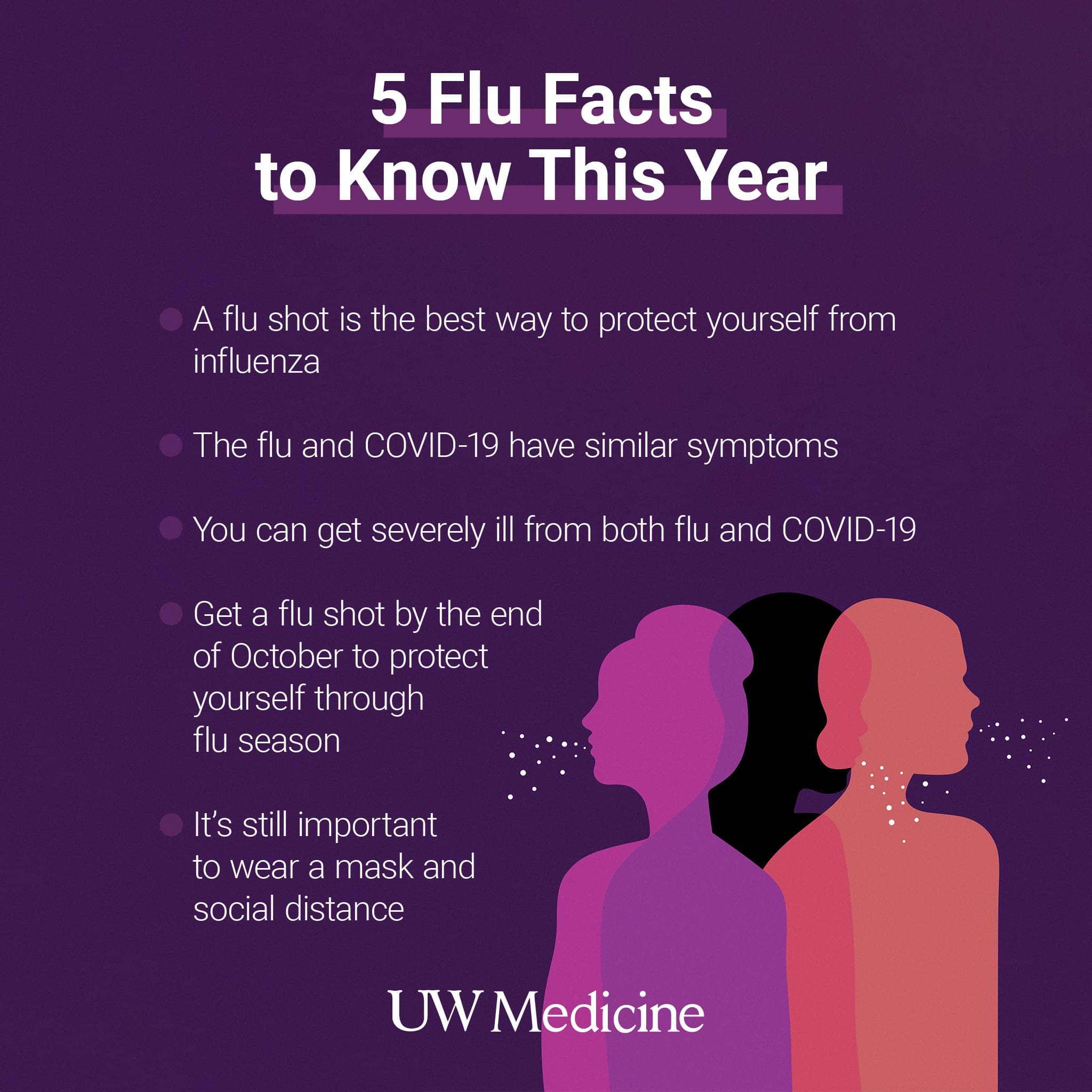Highlights | Flu season during COVID-19
- Seasonal flu and COVID-19 have similar symptoms but are not the same illness.
- There is a possibility to get both influenza and COVID-19 at the same time.
- Both illnesses can be severe and lead to hospitalization or death.
- Getting a flu shot is the easiest way to protect someone from influenza.
- It’s important to get the flu shot each and every year.
- While it’s essential to get a flu shot, people also need to continue wearing masks and physical distancing.
As the COVID-19 pandemic continues into fall and beyond, we have something else to be worried about: the seasonal flu.
Millions of Americans get influenza every flu season, resulting in hundreds of thousands of hospitalizations and tens of thousands of deaths each year. During the COVID-19 pandemic, the 2020-2021 flu season has the potential to be even more deadly and put an even greater burden on our hospitals.
“This year, we have the risk of people getting COVID-19 and the flu at the same time,” explains Amanda Casto, MD, PhD, an infectious diseases fellow at UW Medicine and an acting instructor in the Division of Allergy and Infectious Diseases.
The bright side? You can do your part by sharing these simple facts about the seasonal flu and COVID-19 with your friends and family to help everyone stay safe this year.
Flu and COVID-19 symptoms are similar
According to the Centers for Disease Control and Prevention (CDC), the symptoms for COVID-19 and the seasonal fluare strikingly similar. Both can involve a fever, cough, sore throat, a runny or congested nose, body aches, headaches, fatigue and gastrointestinal issues.
Just because their symptoms are similar, however, doesn’t mean that the two illnesses are the same.
COVID-19 is caused by the new coronavirus SARS-CoV-2, while the seasonal flu is caused by the influenza virus, of which there are multiple strains. These viruses are spread in similar ways, via droplets from an infected person who coughs, sneezes or talks.
What that means is if you or your loved ones cross paths with someone who is infected, you can potentially get sick with both COVID-19 and the flu at the same time.
“Getting sick with both COVID-19 and the flu could put you at a higher risk to get really ill — ill enough to have to go to the hospital,” Casto says.
Flu and COVID-19 can both cause severe illness
What’s even more unfortunate is that people who are at a higher risk of developing a severe illness from COVID-19 overlap quite a bit with those who are at high risk from the flu.
“Anyone who has what we would call an immunocompromising condition — people who have immune systems that don’t work very well — are at higher risk of catching the flu and at a higher risk of getting really ill,” Casto explains.
In addition to those with a compromised immune system, high-risk groups for the flu include pregnant women, children younger than 2 and adults older than 65.
But you can tell your loved ones that just because they don’t fall into one of these high-risk groups or just because they consider themselves relatively healthy doesn’t mean they’re not at risk.
“These two viruses can cause variable symptoms in individual people, anywhere from not knowing you’re infected to being extremely ill and in the hospital,” Casto says. “It’s impossible to predict how sick you’ll get.”
A flu shot can protect you from influenza
While there isn’t a vaccine yet for COVID-19, there is an effective vaccine for influenza: the flu shot. This shot is a safe, easy and effective way to protect someone from influenza.
“We don’t have the opportunity to protect ourselves from COVID-19 with a vaccine yet, but we do have that opportunity for the flu,” Casto says.
Most clinics and pharmacies have flu shots available starting in September, and the CDC recommends all Americans get their flu shot by the end of October.
Young children may need two doses of the flu shot, while adults who are 65 or older might need a high-dose flu shot that offers them even more protection.
Flu shot immunity declines over time
The reason medical experts suggest getting a flu shot in fall?
It takes two weeks after the vaccination to build up antibodies that can protect someone from influenza. Getting vaccinated by the end of October ensures your loved ones are protected during the peak of flu season in winter and beyond.
Still, it’s important to remind your friends and family to get a flu shot every single year. That’s because influenza immunity doesn’t last forever — it diminishes over time and lasts through only a single flu season.
It’s also because there are multiple strains of the influenza virus, with different ones circulating each year. Experts design each year’s flu shots based on which strains they think will be most prominent.
So just because your loved one got a flu shot last year or had the influenza last year doesn’t mean they can skip out this time around — the influenza strain this flu season may be completely different from the one last season.
A flu shot does not protect you from COVID-19
While it’s crucial for everyone to get their flu shot, one thing you can remind your family is that it’s equally important to stay realistic about what the flu shot does and doesn’t do.
The flu shot is for influenza protection alone, not for protection from COVID-19 or other illnesses.
Remember, influenza viruses are completely different from the new coronavirus and the variety of viruses that cause the common cold. And, on top of that, there is not yet a safe, effective COVID-19 vaccine — and even if there were, experts still don’t know how long COVID-19 immunity might last.
So what does that mean for this fall and winter?
“Overall, the most important thing is for people to get their flu shot,” Casto says.
And once you and your loved ones do, remind them to keep wearing a mask, washing their hands and following physical distancing guidelines to continue protecting themselves from COVID-19.
If everyone does their part, we’ll be able to get through this together.
Spread the word, not germs
Help spread the word about the importance of getting your flu shot this year. Share UW Medicine’s five need-to-know flu facts during COVID-19 on your social media channels.

Or tell your Facebook friends that you’ve gotten your flu shot — and remind them to do the same — with a custom UW Medicine frame for your profile picture.
- Go to Facebook’s profile picture frames.
- Search for “UW Medicine Flu Shot” and select the frame.
- Click “Use as Profile Picture” to save.


